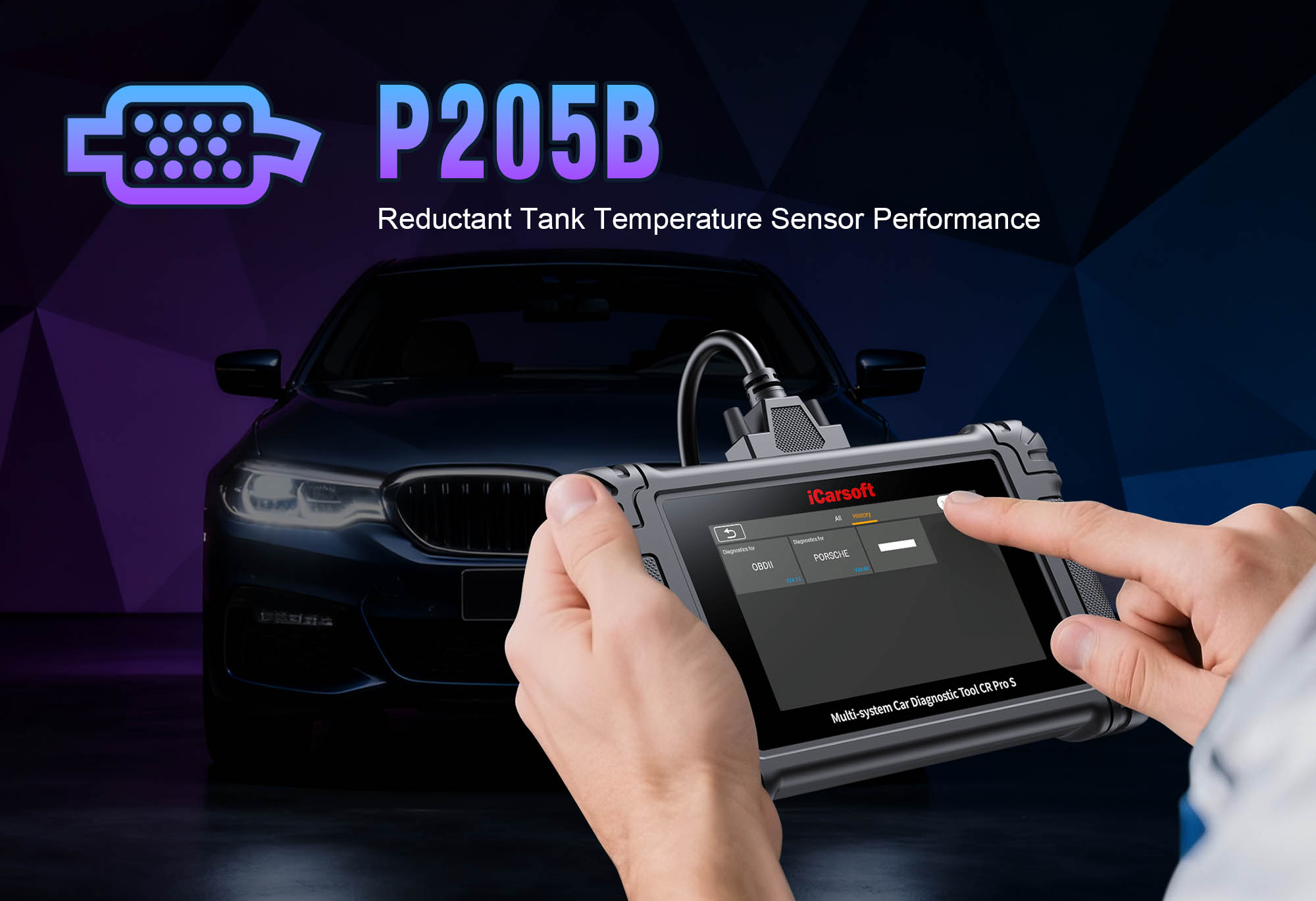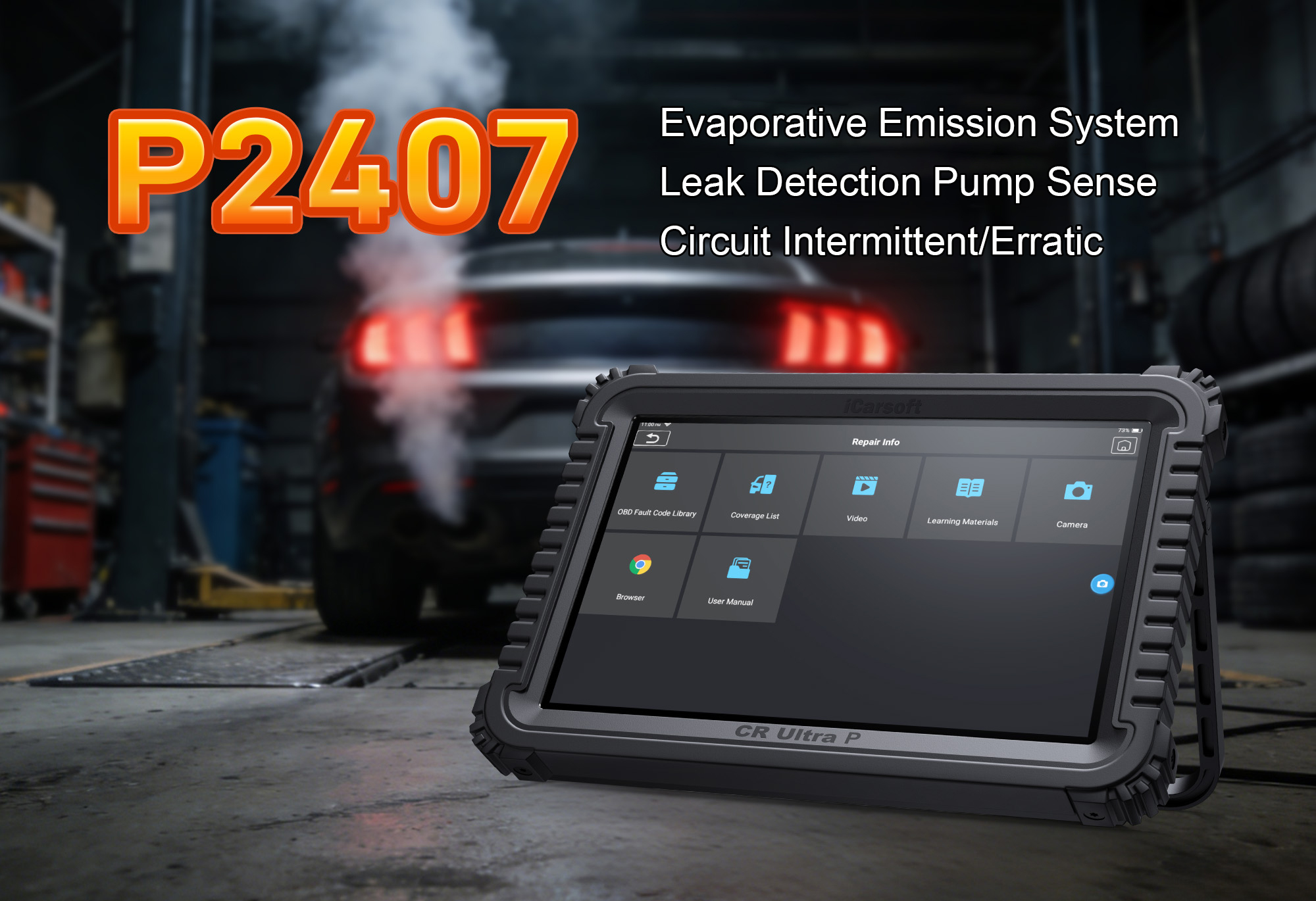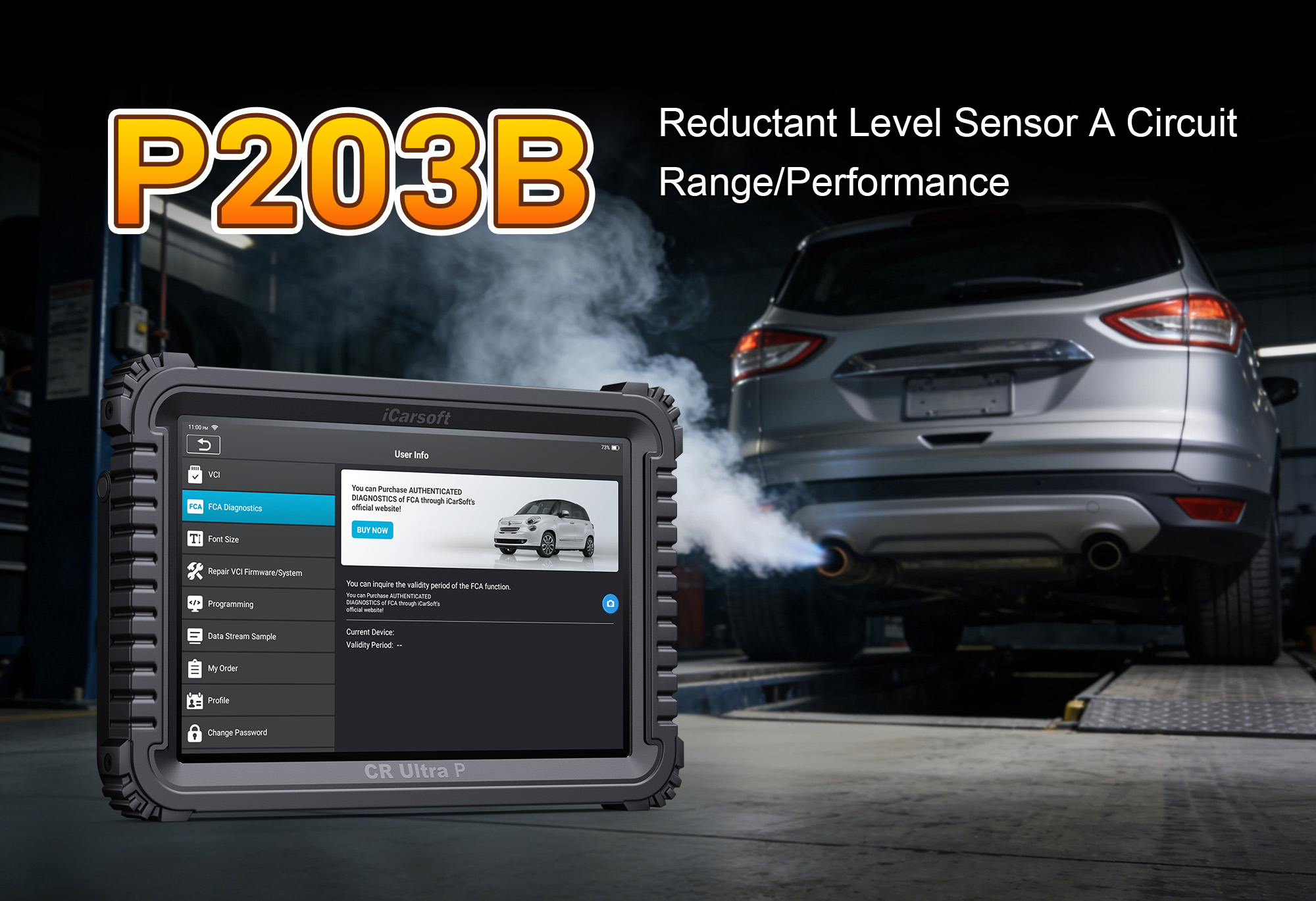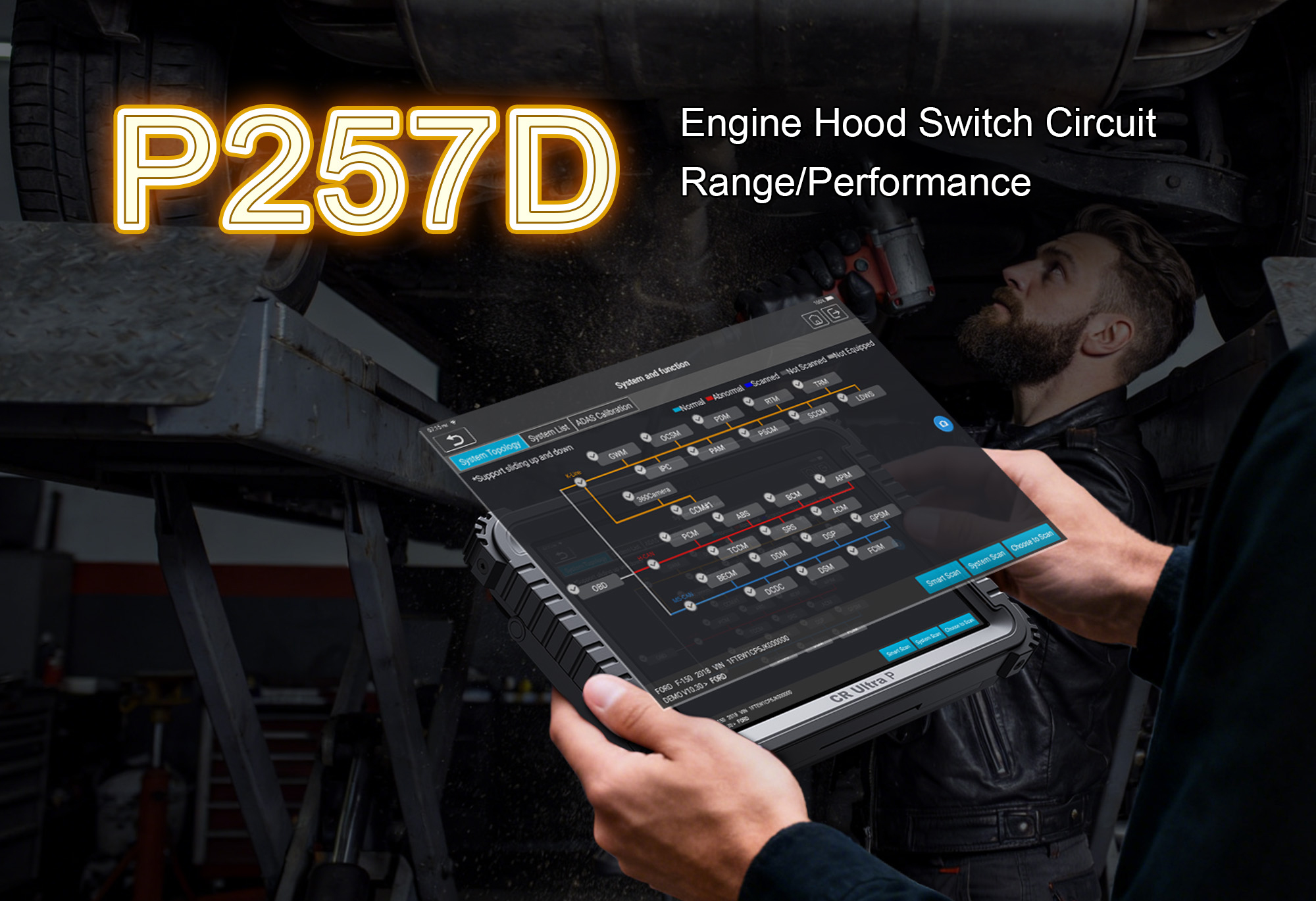Understand & Fix P205B: Evaporative Emission System Purge Flow Sensor Circuit Range/Performance with iCarsoft CR Pro S
If your vehicle’s check engine light illuminates, you notice a fuel odor, or it fails an emissions test, a diagnostic scan will likely return P205B. This OBD-II code stands for "Evaporative Emission System Purge Flow Sensor Circuit Range/Performance"—a critical fault targeting the EVAP system’s purge flow sensor. The EVAP system captures and recycles fuel vapors from the gas tank to reduce emissions; the purge flow sensor monitors the volume of vapors entering the engine for combustion. A "range/performance" error means the Engine Control Module (ECM) detects signals outside the normal range, indicating a malfunction in the sensor, wiring, or EVAP system components.
Basic scanners might only flag a "generic EVAP error" but can’t test sensor responsiveness, verify purge flow, or check circuit integrity—leaving you guessing between a faulty sensor, clogged hoses, or a failing purge valve. The iCarsoft CR Pro S, with its OE-level engine diagnostics, live data tracking, and EVAP system-specific tests, solves this. Below, we break down P205B, its causes, symptoms, step-by-step resolution, and 8 FAQs to answer common troubleshooting questions.
What Is P205B?
P205B focuses on the EVAP system’s purge flow sensor circuit. The purge flow sensor (often part of the purge valve or a standalone component) measures the amount of fuel vapor drawn from the charcoal canister into the engine. The ECM uses this data to adjust purge flow for optimal emissions and fuel efficiency. A "range/performance" error indicates the sensor’s signal is too high, too low, or erratic—signaling issues like a clogged sensor, damaged wiring, or a malfunctioning purge valve.
Key Symptoms of P205B
-
Illuminated Check Engine Light: The primary warning sign, often paired with codes like P0440 (EVAP system malfunction) or P0442 (small EVAP leak).
-
Fuel Odor: Unrecycled fuel vapors may escape, creating a noticeable smell around the vehicle.
-
Poor Fuel Economy: Incorrect purge flow disrupts fuel combustion, increasing consumption by 5–10%.
-
Emissions Test Failure: The EVAP system’s inability to control vapors leads to non-compliance with emissions standards.
-
Rough Idling: Excessive purge flow can cause a lean fuel mixture, leading to engine shaking at low speeds.
-
Reduced Power: Restricted purge flow may limit engine performance, especially during acceleration.
Common Causes of P205B
|
Cause
|
Description
|
|
Faulty Purge Flow Sensor
|
Internal electrical failure or clogging from fuel vapors/debris.
|
|
Clogged EVAP Hoses or Charcoal Canister
|
Debris or fuel residue blocks vapor flow, misleading the sensor.
|
|
Malfunctioning Purge Valve
|
A stuck open/closed valve disrupts purge flow, affecting sensor readings.
|
|
Wiring/Circuit Issues
|
Frayed wires, corroded connectors, or loose terminals disrupting signal/voltage to the sensor.
|
|
Fuel Tank Pressure Sensor Fault
|
Incorrect pressure data from the fuel tank can mimic purge flow sensor issues.
|
|
ECM Malfunction
|
Rarely, the ECM’s internal driver fails to interpret sensor signals correctly.
|
Why iCarsoft CR Pro S Excels at Diagnosing P205B
The CR Pro S outperforms basic tools with features tailored to EVAP system diagnostics:
Live Purge Flow Tracking
Monitors purge flow sensor voltage in real time, highlighting deviations from 0.5V–4.5V that trigger P205B.
EVAP System Leak Detection
Built-in tests (smoke test simulations) to check for leaks in hoses, canisters, or fuel tanks.
Bi-Directional Purge Valve Testing
Sends activation commands to purge valve to verify responsiveness—distinguishes valve from sensor/wiring faults.
Global Vehicle Coverage
Supports 50+ major brands with EVAP systems, including hybrid and electric models.
40+ Hot Service Functions
Includes EVAP reset, purge flow calibration, and charcoal canister maintenance—critical for post-repair validation.
Component Location Tool
Pinpoints purge flow sensor, purge valve, and EVAP hoses for quick access.
Step-by-Step: Diagnose P205B with iCarsoft CR Pro S
-
Confirm P205B & Gather Data
Plug the CR Pro S into your vehicle’s OBD-II port, power on the tool, and select AutoVIN Identify to auto-detect make, model, and EVAP system configuration.
Navigate to Engine > Fault Codes > Read Codes to confirm P205B. Tap Code Details for model-specific insights (e.g., "Honda Civic: EVAP Purge Flow Sensor Circuit Range/Performance; Signal: 0.2V, Expected: 0.5–4.5V; Check Sensor or Purge Valve").
-
Analyze Live EVAP System Data
Go to Engine > Live Data > EVAP System and monitor three key metrics:
1. Purge Flow Sensor Voltage: Fluctuates with engine load (0.5V at idle, 3.0V during acceleration). Fixed/out-of-range values confirm P205B.
2. Purge Valve Status: Shows "Open"/"Closed" per ECM commands—stuck status = valve fault.
3. Fuel Tank Pressure: Abnormal pressure + P205B = leak or sensor issue.
-
Test the Purge Flow Sensor & Purge Valve
1. Use Bi-Directional Control > Engine > Purge Valve Test: Send open/close commands. Listen for clicking and check sensor voltage adjustment. No response = faulty valve.
2. Locate the sensor: Use the CR Pro S’s Component Location tool (on purge valve or EVAP hose near engine).
3. Inspect & Test: Check for damage, clogging, or fuel residue. Use Resistance Test (match OEM specs, e.g., 10–50 ohms—open/infinite = faulty sensor).
-
Inspect EVAP Hoses, Canister, & Wiring
1. Hose/Canister Check: Visually inspect for cracks, leaks, or clogging. Use EVAP Leak Test (if supported) to pressurize and detect leaks.
2. Wiring Check: Use Continuity Test on sensor wiring for breaks/shorts. Look for damage near heat sources or moving parts.
3. Fuel Tank Pressure Sensor Check: Monitor pressure data—erratic readings may indicate a faulty pressure sensor.
-
Repair & Clear the Code
- Replace faulty purge flow sensor or purge valve. Repair wiring, unclog hoses, or replace damaged charcoal canister.
- Use the CR Pro S to Clear Codes and run EVAP System Calibration (under Special Functions) to sync with ECM.
- Test drive to ensure check engine light stays off. Use I/M Readiness Test to verify emissions compliance.
FAQs: P205B Troubleshooting
Can I drive with P205B?
Short trips are possible, but prolonged driving increases emissions and risks fuel system damage. Diagnose with the CR Pro S immediately.
How much does it cost to fix P205B?
A new purge flow sensor costs $50–$150, a purge valve costs $80–$200, plus $100–$200 for labor. EVAP hose/canister repairs add $150–$300. The CR Pro S saves on diagnostic fees ($100–$250).
Why does P205B keep returning after clearing it?
The root cause wasn’t fixed. Common culprits: unaddressed leaks, hidden wiring damage, or a failing fuel tank pressure sensor. Use the CR Pro S’s History Log to track recurrence.
What’s the difference between P205B and P0440?
P205B targets the purge flow sensor circuit, while P0440 is a general EVAP system malfunction. The CR Pro S’s code details distinguish these faults.
How do I distinguish between a faulty sensor and purge valve?
Compare live data: Purge valve responds + erratic sensor signal = faulty sensor; Purge valve doesn’t respond + normal sensor signal = faulty valve.
Do I need to reset the ECM after replacing EVAP components?
Yes—use the CR Pro S’s ECM Reset function to clear old EVAP system data and ensure proper calibration.
Can a loose gas cap cause P205B?
A loose gas cap typically triggers P0442 (small leak), not P205B. However, a damaged gas cap seal may contribute to EVAP issues—inspect it with the CR Pro S’s EVAP Leak Test.
Will P205B affect my vehicle’s warranty?
Unrepaired emissions-related faults may void warranty coverage. Fix P205B promptly with the CR Pro S to maintain warranty validity.
Conclusion
P205B’s EVAP system fault disrupts emissions compliance and fuel efficiency, but the iCarsoft CR Pro S simplifies diagnosis with live flow tracking, leak detection, and calibration tools. It ensures you fix the root cause—whether it’s a faulty sensor, clogged hose, or wiring issue—instead of just clearing the code.
With a 5-inch touchscreen, lifetime free updates, and coverage for 50+ brands, the CR Pro S is a must-have for DIYers and mechanics. Resolve P205B, restore optimal EVAP system performance, and pass emissions tests—all with one professional-grade diagnostic scanner.





